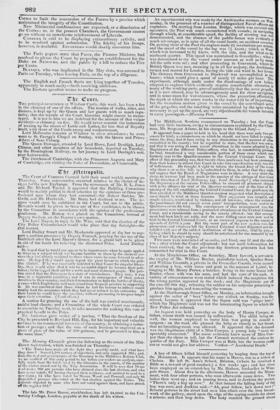The Middlesex Sessions commenced on Tuesday ; but the Court
bad very little business, owing to circumstances explained by the Chair. man, Mr. Sergeant Adams, in his charge to the Grand Jury— It appeared from a paper he held in his hand that there were only two put. smilers tilr trial; a circumstance on which he should not have failed to conga. tulate the jury, had it been owing to any diminution in the amount of crime committed in dme county; but he regretted to state, that the fact was not n, and that it was owing to some recent alterations ill the course adopted by the Magistrates at the different Police-offices, who bad, in committing prisoners for trial, transferred a very considerable, portion of those cases which were formerlv sent to the Quarter-sessions to the Central Crimintd Court. The effect of this proceeding was, that twenty-three gentlemen had been summoned from their homes to attend that Court to take into consideration only two Ws of indictment. He thought it right to inform the Grand Jury of the reason why there were so few bills to be submitted to them, in order that they might not suppose that the Bench of Magistrates were to blame. A very short time since, an increase had been made mo the number of the sittings of that Court by the (Uric:thin of Lord Melbourne, (v. Lord Normonby?) who instructed the Magistrates at the various Police-offices to commit all prisoners charged with petty offence's for trial at the Quarter-sessions; and at the time of the passing of the bill establishing the Central Criminal Court, the gentleman who then preided at the Middlesex Quarter-sessions suggested what description of cases should be tried at those ■.;essions. That suggestion was adopted, and simple Monies, unattended by violence, and all larcenies, where the extent of the punishment did not exceed seven years' transportation, were sent to the Quarter-sessions for trial. The consequence of that arrangement was, that prosecutors were released from a protracted attendance at the Central Criminal Court, and a considerable saving to the county effected : but this arrange. ment had been lately set aside, and the more trifling cases were now sent for trial to the Central Criminal Court, at aim increased expense to the county of upwards of 2,000/. a year. But the worst part of the new system was that prosecutors and witnesses left the Central Criminal Celia disgusted alai dim' satisfied with one of the noblest institutions of the country, trial by jury; A feelinr, which be should be sorry should be entertained for one moment by any Class 'of her Majesty's subjects. Two men were convicted of assaults, and fined, one 5/. and the other las. ; after which the Court adjourned ; but not until information lad been received, that on the previous day fourteen prisoners had been 'committed for trial in this Court.
At the Marylebone Office, on Saturday, Mary Inward, a servant in the employ- of Mr. 'William Bender, pianoforte-maker, Quebec Street, and William Grounds, a private in the Grenadier Guards, were accused of stealing a box, with notes and gold to the amount of 1,500/., be' longing to Mr. Henry Porter, a butcher, living in the same house with Braider, whose wife was his aunt, and had the care of his cash. A variety of circumstances were stated which induced the suspicion that the wrong parties appeared in the dock ; and the Magistrate put off the ease till this day, releasing the soldier on his sergeant promising to produce him again, and remanding the woman.
At the Marlborough Street Office, on Monday, an information brought against the seller of " beer" before one o'clock on Sunday, was dis-
missed, because it appeared that the liquor sold was "ginger heal" which the Magistrate said was not the intoxicating liquor to -which the New Police Act referred.
An inquest was held yesterday on the body of Henry Cowper, an infant, whose death was caused by suffocation. The child being un- well, the woman employed to nurse him was going to consult a surgeon : on the road, she pressed the baby so closely to her breast, that no breathing-room was allowed. It appeared that the deceased
was the illegitimate child of in Miss Cowper, a young lady "most re- spectably connected." The nurse evidently knew snore of Miss Cow- per than she chose to tell, but the Coroner restrained the curious in- quiries of the Jury. Miss Cowper was at Bath, but the woman could not or would not give her address. Verdict—" Accidental Death."


























 Previous page
Previous page